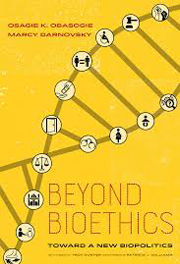Review - Beyond Bioethics: Toward a New Biopolitics
By Jordan Liz,
Metapsychology Online Reviews [Review of the book edited by CGS' Osagie K Obasogie and Marcy Darnovsky]
| 09. 04. 2018
From the successful cloning of Dolly the sheep, to the FDA's approval of BiDil as the first race-specific medication to ongoing discussions concerning the use of gene editing technologies such as "CRISPR," medical innovations during the past couple of decades have raised a number of significant ethical, social and political questions. Should cloning as human reproduction be limited? Is the pursuit of race-based medicine morally acceptable? Would it be a moral failure to abstain from using gene-editing technologies if they are proven safe to use? For Osagie K. Obasogie and Marcy Darnovsky, the editors of Beyond Biopolitics: Toward a New Bioethics, these questions are further complicated by the specific sociopolitical context in which they arise. How do we understand, for instance, the FDA's approval of BiDil alongside the history of race and eugenics in the United States? Addressing these questions requires, on their account, a conceptual framework and approach not found in contemporary bioethics.
To elaborate, for Obasogie and Darnovsky, bioethics currently operates on the basis of principlism. Principlism "provides a common framework by embracing four principles as...
Related Articles
By Dan Barry and Sonia A. Rao, The New York Times | 01.26.2026
Photo by Gage Skidmore from Peoria, AZ, United States
of America, CC BY-SA 2.0, via Wikimedia Commons
Late last month, a woman posted a photograph on social media of a purple hat she had knitted, while a black-and-white dog...
By Shobita Parthasarathya, Science | 01.22.2026
These are extraordinarily challenging times for university researchers across the United States. After decades of government largess based on the idea that a large and well-financed research ecosystem will produce social and economic progress, there have been huge cuts in...
By Nick Paul Taylor, Fierce Biotech | 01.09.2026
Menlo Ventures has made a $16 million bet that the “baby KJ” custom CRISPR therapy success story is repeatable. The funding has enabled CRISPR co-inventor Jennifer Doudna, Ph.D., and baby KJ scientist Fyodor Urnov, Ph.D., to launch Aurora...
By Stephanie Pappas, LiveScience | 01.15.2026
Genetic variants believed to cause blindness in nearly everyone who carries them actually lead to vision loss less than 30% of the time, new research finds.
The study challenges the concept of Mendelian diseases, or diseases and disorders attributed to...




